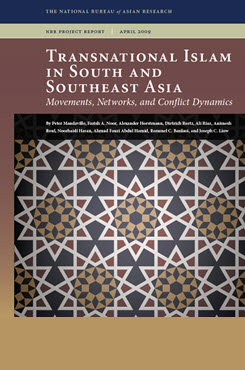From Transnational Islam in South and Southeast Asia: Movements, Networks, and Conflict Dynamics
Transnational Islam in Indonesia
This report assesses the current status of transnational Islamist discourse in Indonesia, in general, and Indonesian Islamist militant groups, in particular, examining their impact on Indonesia’s socio-political and conflict dynamics.
EXECUTIVE SUMMARY
Indonesia is generally associated with a peaceful and tolerant form of Islam. The recent rise of militant Islamist groups in post-Suharto Indonesia, however, and the alleged links of some of these groups to the Southeast Asian terrorist network, the Jamaah Islamiyah (JI), raises concerns. This paper assesses the current status of transnational Islamist discourse in Indonesia, in general, and Indonesian Islamist militant groups, in particular, examining their impact on Indonesia’s socio-political and conflict dynamics. Indonesian Islam is seen as increasingly infused with transnational Islamist currents and activism arising from a global Islamic awakening. The paper argues that Islamist militants do not currently pose a significant threat to Indonesia’s security as many have shifted their strategy of violent jihad toward nonviolent Islamic missionary work and grassroots “Islamization from below.”
MAIN FINDINGS
The collapse of Suharto’s regime and Indonesia’s transition towards democracy gave impetus to the emergence of various Islamists groups competing for the liberated public sphere. The most radical among these groups—such as the Front Pembela Islam (FPI), the Hizb ut-Tahrir Indonesia (HTI), the Laskar Jihad (LJ), and the Jamaah Islamiyah (JI)—rejected participation in the existing system, calling instead for violent jihad. The radical and militant groups’ success waging jihad in Indonesia’s conflict areas paralleled the phenomenal development of the Islamist media in the country, which played a crucial role in disseminating propaganda and directing public opinion. The pressures of the Indonesian government and pro-democracy Muslim groups against violent Islamist discourse and jihadist activism, however, have gradually forced the transnational Islamist groups to leave behind their high profile politics and shift towards a strategy of implementing the shari’a from below at the grassroots level. No longer seeing violent jihad as a relevant means for realizing their goals, many groups now argue that da’wa is more appropriate to foster Indonesian Muslims’ awareness of their duty to uphold the supremacy of the shari’a. These groups also believe that nonviolent endeavors are more suitable to Indonesia’s current situation and crucial to defend Muslim solidarity and the long-term struggle for a comprehensive Islamic order.
POLICY IMPLICATIONS
- Organizationally, Indonesia’s transnational Islamist groups are largely broken; their leaders and members are mired in debates and conflicts. However, as social movements, embedded in interpersonal networks and informal nodes of activism, they retain deep roots and visions of establishing an Islamic state. Some seek to consolidate themselves by fanning the flames of sensitive Islamic issues, but they have to first confront the Indonesian government and the pro-democracy alliances that firmly reject jihadism.
- The one hope for the militant jihadists depends on the mushrooming da’wa groups which designate Indonesia’s youth as the main target for Islamizing society at the individual level. Although such groups seemingly delegitimize the jihadists’ struggle, their growing influence among youths no doubt broadens the Islamist constituences that can potentially be drawn into the jihadist orbits. This is especially so if the state and civil society forces fail to demonstrate their commitment for good governance and accountability and systematically campaign for democracy and human rights.


